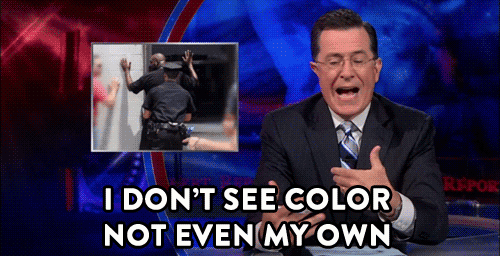This is the second in a series of posts that Ian Haney López, the author of Dog Whistle Politics: How Coded Racial Appeals Have Reinvented Racism and Wrecked the Middle Class, will be writing in the weeks leading up to the November election.
“You know who talks about race? Racists!” That was a Fox commentator, unintentionally providing a pithy summary of the conservative reaction to the national conversation surrounding the Ferguson, Missouri, police shooting. To note that the officer is white and the victim black — well, that’s just needlessly injecting race into an already volatile situation, right-wing pundits repeatedly charged.
Jon Stewart, in a biting Daily Show segment last week, skewered this rhetoric, asking incredulously of Fox, “did you just ‘he-who-smelt-it-dealt-it’ racism?”
If a bit scatological, Stewart’s humorous rejoinder nevertheless nails it.
Repeatedly, we see those who try to have a serious conversation about racism trashed as racists, as if the person who pulls a fire alarm invariably started the fire, or as if the person who calls 9-1-1 must have committed the crime.
Obviously, that’s ludicrous. But this sort of attack has been a staple of conservative discourse for almost 50 years, and it has been devastatingly effective in shutting down conversations about race. How could such a silly charge be so potent in practice? Part of the answer lies in the conservative hijacking of a concept that was birthed to promote racial justice: colorblindness.
During the early civil rights era, colorblindness was the movement’s watchword: the call for government to be “color-blind” powerfully encapsulated the demand that states and localities stop using race to segregate schools, workplaces, voting booths, marriage altars, graveyards, and on and on. A colorblind bar on Jim Crow segregation laws, many fervently hoped, would hasten progress toward an ideal world in which color did not correspond to privilege or disadvantage.
Yet even as reformers moved on, reactionaries saw advantages in appropriating colorblindness rhetoric. First, if formal colorblindness became the sole measure of discrimination, then colorblindness would shield continued inequality. So long as the machinations behind segregation remained hidden, abstract colorblindness could not see any mistreatment. If no one mentioned race, ostensibly racism ceased to operate.
More than just shielding segregation, colorblindness could also be used to slash at integration — because, arguably, colorblindness banned the government from using race even for laudable purposes. As a Southern court put it in 1965, “the Constitution is color-blind: it should no more be violated to attempt integration than to preserve segregation.” This version of colorblindness furtively redefined racism from group degradation to merely mentioning race — and since it was often do-gooders who talked about race or promoted race-targeted remedies, they were the new racists.
It may seem a stretch to link contemporary Fox News rhetoric to devolutions in colorblindness from 50 years ago. But rather than this being ancient history, these two guises of reactionary colorblindness — as a shield protecting discrimination that continues without mentioning race, and as a sword against reform efforts that invoke race directly — form staples of modern racial discourse because they are intimately bound up with dog whistle politics.

A clip from The Colbert Report in a segment about the end of stop and frisk in New York City from August 2013. (Credit: Global Grind)
Dog whistling emerged at the same time that colorblindness was slipping from progressive to reactionary. Naked appeals to racial solidarity had been common in Southern politics, but the civil rights movement made them unacceptable, prompting politicians to shift to new, coded terms just as race baiting became national in scope. In the shift to veiled entreaties, the co-opted version of colorblindness provided protection. What racism, dog whistlers could ask, if they never directly mentioned race when railing against forced busing, welfare queens, gang bangers, illegal aliens, and terrorists? And weren’t their critics the real racists, they could demand to know, for always talking about race? Anticipating today’s Fox pundits, back in 1968 a dog whistle pioneer slammed his critics as the actual fiends: “You know who the biggest bigots in the world are? They’re the ones who call others bigots.”
With Jon Stewart, we should jeer at the farcical claim that mentioning race makes one a racist — but we should also recognize that such rhetoric has power because, by invoking colorblindness, it sounds principled. A recent Pew survey shows that nearly half of whites think that race is getting too much attention in discussions of Ferguson; among Republicans, that number surges to three out of five. Just stop talking about race, these folks seem to believe, and all will be fine. The reverse is true. For the last half century, conservatives have manipulated colorblindness to protect segregation — in schools, cities, police forces, and also, in politics. The path out of this labyrinth lies in the opposite direction, in open discussions of racial inequities and racial pandering, no matter how uncomfortable that might be.
This work is licensed under a Creative Commons Attribution-NoDerivatives 4.0 International License.


